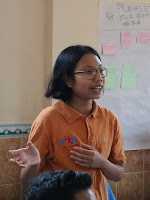Connecting Soul, Celebrating Diversity
Monday, 26 August 2019by adminstube
 Being smart in managing the existing differences in Indonesia is the key to the country's stability and guaranteeing the security of the citizens. Religious symbols, ethnicity, race or certain groups make people divided in variety of differences, also prejudice and radicalism will add to the freezing gap of communication and interaction among community members. The training with a title in Indonesian language: Menghubungkan Jiwa, Merayakan Perbedaan (Connecting Soul, Celebrating Diversity), is one of the contributions of Stube-HEMAT for this nation.
Being smart in managing the existing differences in Indonesia is the key to the country's stability and guaranteeing the security of the citizens. Religious symbols, ethnicity, race or certain groups make people divided in variety of differences, also prejudice and radicalism will add to the freezing gap of communication and interaction among community members. The training with a title in Indonesian language: Menghubungkan Jiwa, Merayakan Perbedaan (Connecting Soul, Celebrating Diversity), is one of the contributions of Stube-HEMAT for this nation. Stube-HEMAT Yogyakarta training on Multicultural Training and Interreligion Dialogue at Kukup Indah Hotel, Kukup beach area, Gunungkidul, Special Region of Yogyakarta, Friday-Sunday, August 23-25, 2019, became a forum for discussion and interaction of students from various regions studying in Yogyakarta. Delegations from Stube-HEMAT Bengkulu, activits of Stube-HEMAT Sumba and participants of South to South Program from Student Christian Movement of India (SCMI) took part in contributing ideas in the three-day training.
Stube-HEMAT Yogyakarta training on Multicultural Training and Interreligion Dialogue at Kukup Indah Hotel, Kukup beach area, Gunungkidul, Special Region of Yogyakarta, Friday-Sunday, August 23-25, 2019, became a forum for discussion and interaction of students from various regions studying in Yogyakarta. Delegations from Stube-HEMAT Bengkulu, activits of Stube-HEMAT Sumba and participants of South to South Program from Student Christian Movement of India (SCMI) took part in contributing ideas in the three-day training.
Connecting Soul Celebrating Diversity encouraged participants to get to know each other despite diverse backgrounds and together campaign for diversity acceptance in Indonesia. Ariani Narwastujati, Executive Director, conveyed the intricacies of Stube-HEMAT's servicess, as well as the diversity of networking at the international level, which requires each individual to understand their existence as part of diversity itself. The Student Christian Movement of India (SCMI) is one of the diversity of networks owned by this institution. Inbaraj Jeyakumar, General Secretary of SCM of India expressed the pleasure of meeting students in Indonesia and moving with SCMI to fight for equality for men and women, human rights, education, poverty alleviation and humanity.
Next, the participants explored examples of local wisdom in various regions in Indonesia such as Sandinganeng in Halmahera and Sintuwu Maroso in Poso. The cultural and art performance night was exciting with the participants’ performances started from Aru Islands song and local Nias song, poetry, song and gestures from India and theater by the trainees. It made the feeling of togetherness among participants grew stronger.
The participants' follow-up actions with new knowledge and experiences that they have during the training were manifested in their action plans to voice tolerance, understanding inclusion and togetherness through diversity videos, writing about regional cultural heritages, student discussions and participation in interfaith and cross culture movements. Hopefully in the future everyone will find interrelation without prejudice and discover the beauty of diversity in Indonesia. (TRU).
Web Archive
2024 (5) 2023 (38)
2013 (20)
2012 (12)
2011 (2)
2010 (18)
Total: 448









